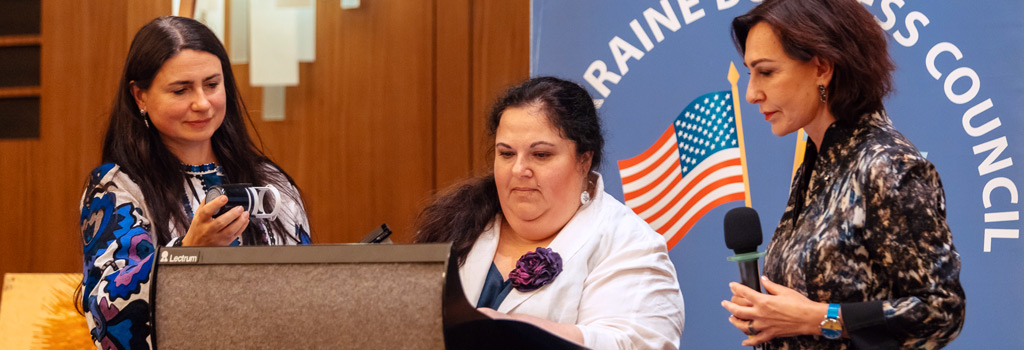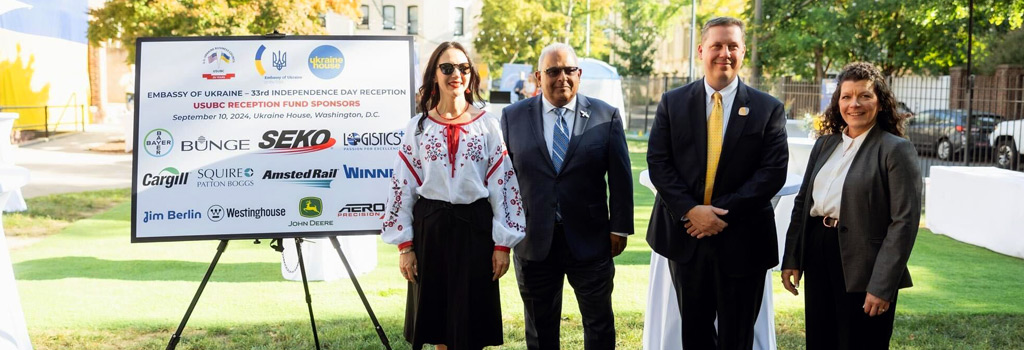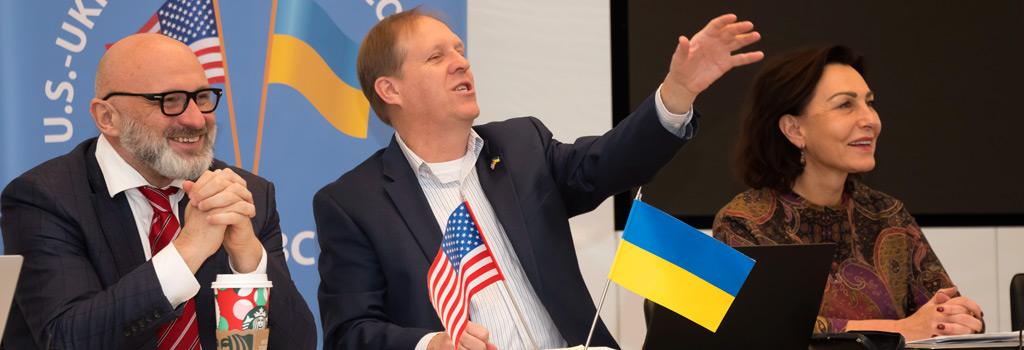Featured Galleries USUBC COLLECTION OF OVER 160 UKRAINE HISTORIC NEWS PHOTOGRAPHS 1918-1997
 Holodomor Posters
Holodomor Posters

WHAT UKRAINE NEEDS TO DO ABOUT ECONOMIC POLICY IN 2022
 Op-Ed by Anders Åslund
Op-Ed by Anders Åslund
Kyiv Post, Kyiv, Ukraine
Wed, Jan 12, 2022
WASHINGTON, D.C. - Ukraine has attained significant macroeconomic stability, but its growth is unsatisfactory. The International Monetary Fund’s assessment is that Ukraine’s Gross Domestic Product (GDP) grew by just 3.2 percent in 2021 and forecasts growth of 3.6 percent in 2022.
Ukraine has become the poorest country in Europe, as Moldova has overtaken Ukraine and it’s growing faster than Ukraine. Given its access to the vast, affluent European market, Ukraine should grow by 7-8 percent a year, but investment, both domestic and foreign, remains tiny in Ukraine. Foreign direct investment was even negative in 2020.
Old problems holding back growth.
The Ukrainian government needs to adopt and pursue a growth-oriented policy.
First of all, it needs to adopt a credible program for high economic growth, which focuses on resolving the persistent problems in the Ukrainian economy: the absence of the rule of law, a corrupt and predatory state administration, and corporate raiding. It is customary to complain about the oligarchs, but only wealthy businessmen with good political connections are able to defend their ownership rights. It is primarily the Ukrainian state administration that needs to be cured.
The main problem is the dysfunctional top courts and the General Prosecutor’s Office. Blatantly corrupt judges and prosecutors must be sacked. Given that the legal profession in Ukraine has become permeated with corruption, Ukraine needs help from foreign judges of high standing to do so. Fortunately, the new Ukrainian legislation on the Supreme Council of Justice should facilitate the cleansing of the top courts.
Renewed reform of the General Prosecutor’s Office is also needed. Today, it operates as a political agency, prosecuting the foes of the Presidential Office, while ignoring the prosecution of its friends.
Presidential Office became back-seat driver
The Zelenskyy administration has created a novel problem, by stopping the normal work of the Cabinet of Ministers. The Cabinet of Ministers has traditionally been in charge of economic policy, while the Presidential Administration supervised domestic and foreign policy.
The Zelenskyy administration has restored old-style Soviet phone rule. Decisions are made in the Presidential Office and somebody, an unknown figure, calls the relevant minister or the prime minister and tells that person what has been decided.
The chaos inside the Cabinet of Ministers has been aggravated by frequent personnel changes. Zelenskyy loves sacking ministers, while the only relevant criterion for appointment appears to be that he knows the candidate and perceives him or her as loyal. Competence and qualifications have lost significance.
In the space of two years, Ukraine has had seven ministers of energy, three were confirmed and four were merely acting. Therefore, the Ukrainian government has been unable to formulate or implement any energy policy. Elementary competence, stability and authority need to be restored in the Cabinet of Ministers.
Green tariffs non-payment hit FDI, country’s image
The immediate reason for the negative foreign direct investment in Ukraine in 2020 was that the government refused to pay the high green tariffs that had been guaranteed to producers of wind and solar energy. After unsuccessful talks with producers, the government cut the tariffs through new legislation.
As if to add insult to injury, it did not even pay the new tariffs. In the period of 2016-19, renewable energy had attracted substantial foreign direct investment because of the high state-guaranteed green tariffs, so the Zelenskyy administration’s inability to handle this matter caused considerable concerns. A couple of the foreign investors have apparently initiated international arbitration against Ukraine on the basis of bilateral investment treaties.
Ukrainian electricity pricing policy and payments are exceedingly complex, and with a revolving minister of energy no policy can be developed. Ukraine should gradually reduce cross subsidization and move to market prices, while promoting decarbonization and new investment. Fortunately, the IMF has now made electricity payments one of its conditions for financing. In addition, Ukraine plans to join the Central European electricity grid, ENTSO-E, from 2023. Its rules should help Ukraine to get its electricity policy right.
Better governance of state assets would boost growth
Ukraine needs strong institutions with competent well-paid staff. The first such institution was the National Bank of Ukraine (NBU) from 2014. While the Zelensky administration has ousted its original leadership, it appears to have accepted NBU integrity because of pressure exerted by the IMF.
The National Anti-Corruption Bureau (NABU) was another important independent institution. After considerable attacks, mainly from the Constitutional Court, it appears to have weathered the resistance. One great reform that works well is the decentralization of financing and passing of powers to cities and local communities.
Unfortunately, the Zelenskyy administration does not understand the value of good corporate governance in state-owned enterprises and banks. The Presidential Office insists on appointing its friends to top positions regardless of qualifications, while it seems remarkably disinterested in their economic efficiency.
The IMF and the United States now demand that the Ukrainian government fulfills its commitments on good corporate governance. This is a major battlefield between the current Ukrainian administration and its Western supporters, who appear more committed to high economic growth in Ukraine than the current leadership.
Public finances in good shape despite high inflation
Still, the current administration should be praised for what it has done about macroeconomic stability. Ukraine has maintained a small budget deficit, and its public debt is relatively limited at 50 percent of GDP.
The NBU has refilled the international currency reserves that the ousted leadership under Viktor Yanukovych almost depleted. This enables the exchange rate to float on the market. Admittedly, Ukraine’s inflation is high at 10 percent year-over-year in December, though much of this is down to high commodity prices, and the NBU has hiked its interest rate to 9 percent.
It is great that the United States, the IMF and other international bodies have sharpened their focus on economic reforms like electricity trading and corporate governance, after the Coronavirus pandemic abated in Ukraine.
However, an often-repeated truth is that foreign donors cannot desire reform more than the domestic rulers. It is time for President Zelenskyy to prove his true colors. Is he interested in economic growth, higher living standards for Ukrainians and the rule or law or not? This new year should be the year for him to prove just that.
LINK: https://www.kyivpost.com/article/opinion/op-ed/what-ukraine-needs-to-do-about-economic-policy-in-2022.html
USUBC NOTE: Anders Åslund is a Senior Fellow, Stockholm Free World Forum. Anders has served as a Senior Advisor to the U.S.-Ukraine Business Council (USUBC). www.USUBC.org, for over 20 years.

















